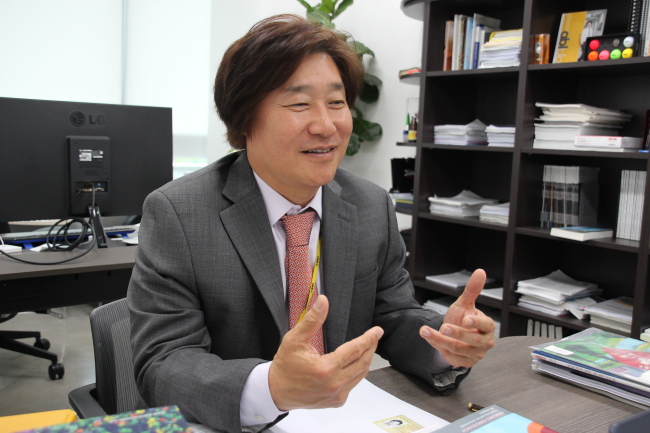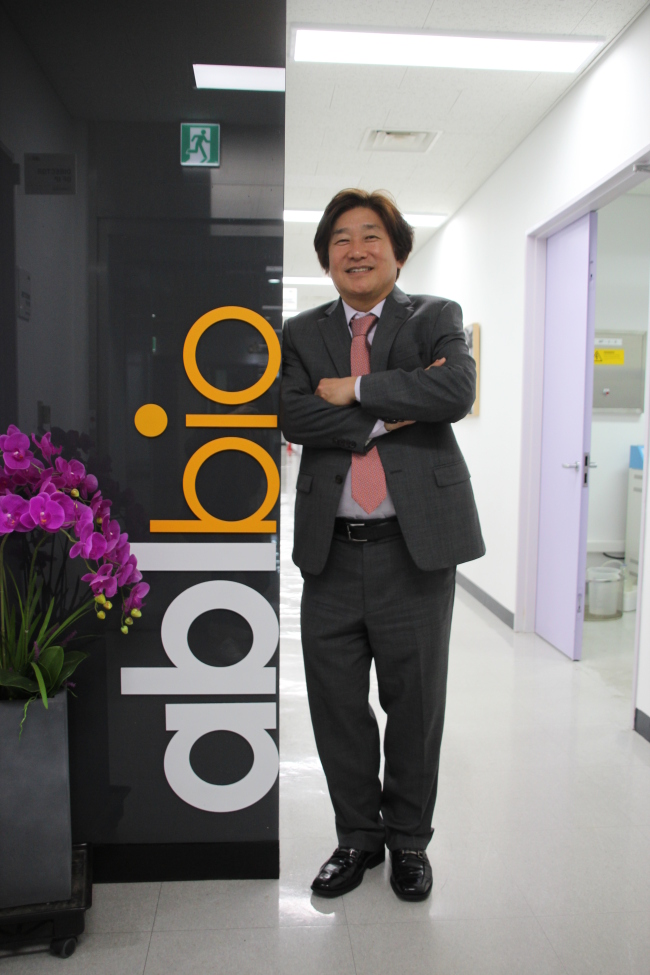[Herald Interview] [Bio Startups] Buying and selling technology vital to ABL Bio business model
By Lim Jeong-yeoPublished : May 12, 2019 - 15:32
The Korea Herald is publishing a series of interviews with up-and-coming startups in the biotech sector in cooperation with the Korea Biotechnology Industry Organization. -- Ed.
The development process for a novel drug -- from the discovery of a drug candidate through the preclinical trial phase, on to clinical trial phases 1, 2 and 3 and finally commercialization -- normally requires 10 years and at least 1 trillion won ($858 million).
What innovative biotech startups do to sustain their businesses, therefore, is license drug candidates out to other firms for co-development in the early stages, in exchange for a fee and a cut of the royalties.
But while out-licensing deals get extensive media coverage, the in-licensing of foreign drug candidates is a vital part of the biotech business that merits more attention, Lee Sang-hoon, CEO of super-rookie biotech firm ABL Bio, told The Korea Herald.
“In-licensing and out-licensing deals are a core aspect of open innovation,” Lee said. “Buying and selling technology at various stages of development allows biotech firms to focus on what they are good at, whether that’s the early or late discovery of drug candidates, clinical trials, or applying for innovative drug approval and commercialization.”
The development process for a novel drug -- from the discovery of a drug candidate through the preclinical trial phase, on to clinical trial phases 1, 2 and 3 and finally commercialization -- normally requires 10 years and at least 1 trillion won ($858 million).
What innovative biotech startups do to sustain their businesses, therefore, is license drug candidates out to other firms for co-development in the early stages, in exchange for a fee and a cut of the royalties.
But while out-licensing deals get extensive media coverage, the in-licensing of foreign drug candidates is a vital part of the biotech business that merits more attention, Lee Sang-hoon, CEO of super-rookie biotech firm ABL Bio, told The Korea Herald.
“In-licensing and out-licensing deals are a core aspect of open innovation,” Lee said. “Buying and selling technology at various stages of development allows biotech firms to focus on what they are good at, whether that’s the early or late discovery of drug candidates, clinical trials, or applying for innovative drug approval and commercialization.”

ABL Bio, for example, specializes in research -- the identifying of potential drugs before they are developed and go through clinical trials. Lee likened biotech businesses to businesses that provide food, with different kinds of stores and restaurants occupying different positions along the chain.
“When people buy food, they sometimes get raw ingredients and cook at home. Or they can get a takeout meal that can be reheated and served, or they can straight up eat at a restaurant,” Lee said.
ABL Bio, then, is like a grocery store that supplies raw ingredients, but at the same time also runs a line in buying ingredients in and selling ready-meals to reduce risk and cover lean times in its main business.
“A business model is ideal when in a form that allows a biotech’s (strong points) and know-how to shine through,” Lee said, “‘No research, development only’ might be the right course of action depending on a firm’s needs.”
ABL Bio’s goals
ABL Bio’s short-term goal for this year is to in-license a novel drug candidate and bring it to market. This is a strategy to fill in the two-year time gap between the anticipated clinical trial results for gastric cancer treatment candidate ABL 001 -- due in June -- and the other drugs in the ABL Bio pipeline that haven’t yet reached the clinical trial phase.
By licensing in promising novel drug candidates from Chinese partner firm WuXi Biologics, and at the same time beginning the phase 1b clinical trial of ABL001 in the third quarter of this year, ABL Bio would enjoy a continued stream of business and innovation.
Lee said he wished to license in an immuno-oncology candidate, in line with ABL Bio’s current focus on oncology and neurology.

ABL Bio currently has some 20 products in its pipeline, which it is co-researching and developing with partner firms. Each ABL Bio researcher takes on about three projects, and the order of priority for those projects is clearly defined. ABL Bio will hire at least 10 more personnel this year, he said. The recruitment is not limited to researchers, but will also include project managers who will oversee adherence to project time lines as well as budget financiers, so the scientists will have the freedom to focus entirely on research. Currently, 46 of ABL Bio’s 55 employees are researchers.
In April, ABL Bio dispatched an employee to California’s Silicon Valley -- advance preparation for a US launch someday. Mergers and acquisitions of firms with expertise in different areas of biotech are always a possibility, Lee said.
Apart from having founded a company whose estimated value has soared to 1.6 trillion won in just three years, Lee has a stellar background in biopharmaceutical research at top-class institutions. He completed postdoctoral fellowships at Harvard Medical School and the University of California, San Francisco, and was a scientist at Stanford Medical School. He worked for the US bio firm Chiron, and also spent time at AstraZeneca, Genetech and Exelixis.
After returning to Korea, Lee co-founded PharmAbcine and later went on to serve as head of the biotech division at Hanwha Chemical. When Hanwha decided to scrap the division, Lee founded ABL Bio.
Established in February 2016, the company -- whose name stands for “a better life” -- drew investors’ attention and raised series A, B and C investments worth more than 90 billion won.
By the time ABL Bio became a listed company on the secondary bourse, Kosdaq, in December 2018, it was worth 602 billion won. It has since received funding worth another 90 billion won and has secured out-licensing deals and investments worth hundreds of millions of dollars, according to Lee. The company as of April 2019 held over 150 billion won in cash reserves and its estimated value was 1.6 trillion won. Market watchers predict that the bispecific antibody market will be worth 9.3 trillion won by 2023. At the time of this interview in mid-April, 1.94 percent of ABL Bio shares were owned by foreign shareholders -- a high figure compared with other biotech companies that have been in business longer.
ABL Bio’s success on the bourse catapulted Lee to No. 1 on the Korea Economic Daily’s 2018 list of the new stock-rich with some 225 billion won worth of stocks.
“Scientists usually are not associated with wealth, and I consider it an honor to have the opportunity to be included on the rich list,” Lee said.
Believing all the company’s workers must share in its profits, ABL Bio gives stock options to every employee according to his or her position.
“This is how we build a better life -- ABL -- for our employees,” Lee said.
Not a single founding member has left ABL Bio.
Major ABL Bio pipeline products span a range of areas -- angiogenesis, antibody-drug conjugates, immuno-oncology and neurology.
ABL001, the focus of its most mature project, is a targeted anti-cancer drug candidate that was licensed out to Trigr Therapeutics for $595 million in 2018. Antibody-drug conjugate ABL201-20X, also a prospective cancer treatment, is being developed in collaboration with LegoChemBio. ABL Bio’s multiple T cell engagers have been licensed out to Trigr Therapeutics, Dong-A ST and Yuhan Corporation and are being developed in collaboration with those companies. Dual immune cell-targeting BsAb is being developed in collaboration with I-Mab Biopharma.
By Lim Jeong-yeo (kaylalim@heraldcorp.com)








![[Graphic News] More Koreans say they plan long-distance trips this year](http://res.heraldm.com/phpwas/restmb_idxmake.php?idx=644&simg=/content/image/2024/04/17/20240417050828_0.gif&u=)
![[KH Explains] Hyundai's full hybrid edge to pay off amid slow transition to pure EVs](http://res.heraldm.com/phpwas/restmb_idxmake.php?idx=644&simg=/content/image/2024/04/18/20240418050645_0.jpg&u=20240419100350)





![[From the Scene] Monks, Buddhists hail return of remains of Buddhas](http://res.heraldm.com/phpwas/restmb_idxmake.php?idx=652&simg=/content/image/2024/04/19/20240419050617_0.jpg&u=20240419175937)

![[KH Explains] Hyundai's full hybrid edge to pay off amid slow transition to pure EVs](http://res.heraldm.com/phpwas/restmb_idxmake.php?idx=652&simg=/content/image/2024/04/18/20240418050645_0.jpg&u=20240419100350)

![[Today’s K-pop] Illit drops debut single remix](http://res.heraldm.com/phpwas/restmb_idxmake.php?idx=642&simg=/content/image/2024/04/19/20240419050612_0.jpg&u=)